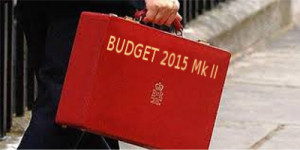UK Summer Budget 2015 – Roundup

George Osborne today presented his Summer 2015 Budget
Why Summer? Because we’ve already had one this year, and with a change in government (kind of) we’ve been treated to another.
The government website condenses the budget statement into 24 key points. These serve two purposes:
- To cut the budget deficit of £12 billion down to zero
- To implement Conservative Party policy, especially in areas not available to them under the previous coalition
We discussed the Chancellor’s options for cutting £12 billion a few days ago, predicting tax cuts as well as large spending cuts. Let’s see what happened.
Tax cuts
- Personal allowance: rising from £10,600 to £11,000 in April 2016. This is more than we estimated.
- Inheritance tax: a married couple will be able to pass on up to £1m tax free from April 2017. This was expected. However estates over £2m will see the allowance eventually withdrawn.
- Higher tax rate: 40% paid on amounts over £43,000, up from £42,325. Just a small increase.
- Corporation tax: down to 19% in 2017 and 18% in 2020 from 20% today.
- Annual Investment Allowance (for businesses): current (temporary) allowance of £200,000 to be made permanent. This is a tax relief on the amount reinvested reinvested in plant.
- Employment Allowance: rising to £3,000 from £2,000 in April 2016. This is a National Insurance saving for employers
Tax rises and new taxes
- Tax relief on pension contributions: to be reduced for people on incomes over £150,000 from April 2016.
- Insurance premium tax: to rise from 6% to 9.5% from November 2015.
- Tax relief for landlords: to be limited to 20%, thereby affecting landlords paying 40% tax or above. There are to be other restrictions on how landlords save on tax too.
- Non-doms: to be taxed as UK residents if they have been living in the UK for 15 of the last 20 years
Tax reforms – could be good or bad!
- Dividend income: the tax credit system will go, and will be replaced with a £5,000 tax-free allowance.
- Tax on banks: The “Bank Levy” will be gradually reduced from 0.21% to 0.10% by 2021, after which time only UK balances will be subject to the tax.
Spending cuts
We predicted a big hit to tax credits. We were right.
- Universal Benefit: 18-21 year olds will need to enrol on a course to receive this
- Child tax credit: to be limited to 2 children
- Household benefit cap: reduced to £23,000 in London, £20,000 elsewhere
- Rents for social housing: to be charged at market rates for those earning £40,000 (London) or £30,000 (elsewhere)
- Student maintenance grants: to be replaced by loans
Other announcements
The anouncement which the Chancellor saved till the end, and was intended to grab the headlines was: National Living Wage of over £9 per hour by 2020, starting with £7.20 per our in April 2015. Other important parts of the budget were:
- A levy on large companies to fund apprenticeships on the basis that those who create apprenticeships will get back more than they put in
- Reining in the activities of claims management businesses
- £30m for “Transport for the North”
- Road tax to be reformed and ring-fenced so that income is spent on roads
- Public sector pay increase of 1% per year
- 30 hours of free childcare for 3-4 year olds
- A tougher policy on tax avoidance by companies
In summary
It looks like the Chancellor is giving with one hand and taking a bit more with the other. The intended £12bn will not be saved immediately, but by 2019-2020 he intends there to be a budget surplus, presumably to make up for the deficit today.
Right wing think tanks the Adam Smith Institute and the IEA have criticised the budget for its National Living Wage. These organisations have never favoured a minimum wage anyway, so that is to be expected. Other right-wingers would like to have seen the 45% tax rate go – perhaps we can expect that next year. The taxing of “non-doms” has also drawn criticism, as these people spend money in the UK and provide employment. But then again so do many non-non-doms. The National Living Wage looks like a smart move, politically as much as anything else. The Conservatives want to be seen as the party for working people, and they hope that along with the raising of the personal allowance, they will not be seen as a part just for the rich.
But are the low-paid better off? With tax credits being cut, possibly not. Labour’s response was to acknowledge that the deficit had to be cut, but not to the cost of the low paid. Speaking for Labour, Harriet Harman said she would like to have seen more investment into infrastructure and skilled workforces.







